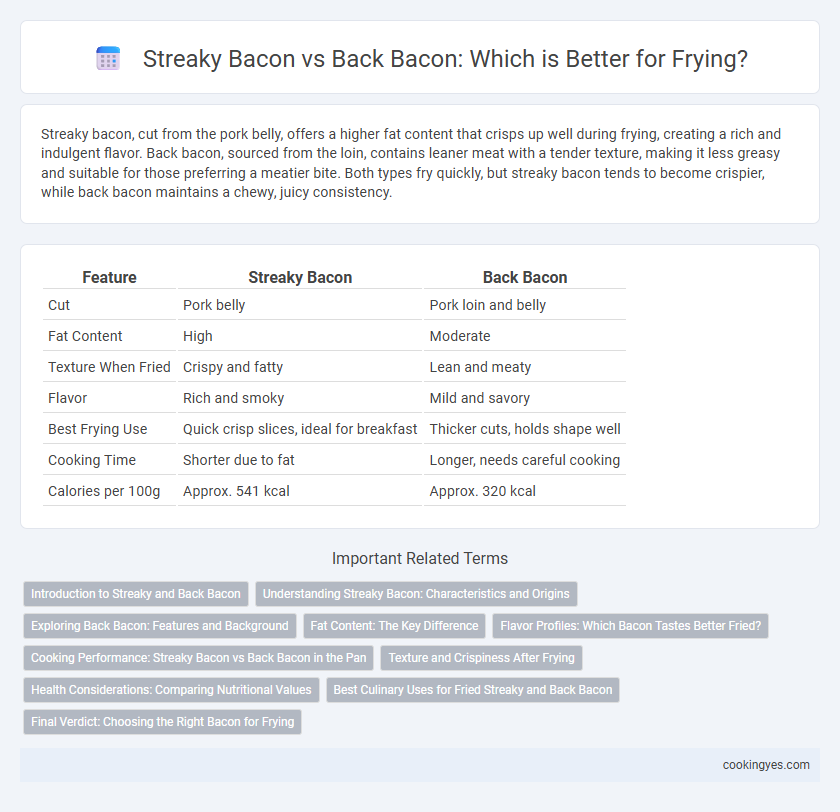Streaky bacon, cut from the pork belly, offers a higher fat content that crisps up well during frying, creating a rich and indulgent flavor. Back bacon, sourced from the loin, contains leaner meat with a tender texture, making it less greasy and suitable for those preferring a meatier bite. Both types fry quickly, but streaky bacon tends to become crispier, while back bacon maintains a chewy, juicy consistency.
Table of Comparison
| Feature | Streaky Bacon | Back Bacon |
|---|---|---|
| Cut | Pork belly | Pork loin and belly |
| Fat Content | High | Moderate |
| Texture When Fried | Crispy and fatty | Lean and meaty |
| Flavor | Rich and smoky | Mild and savory |
| Best Frying Use | Quick crisp slices, ideal for breakfast | Thicker cuts, holds shape well |
| Cooking Time | Shorter due to fat | Longer, needs careful cooking |
| Calories per 100g | Approx. 541 kcal | Approx. 320 kcal |
Introduction to Streaky and Back Bacon
Streaky bacon, cut from pork belly, features alternating layers of fat and meat, making it ideal for frying due to its rich, crispy texture. Back bacon, sourced from the loin with a leaner profile and a distinctive round shape, cooks evenly with a tender bite. Both streaky and back bacon offer unique frying experiences that cater to different texture and flavor preferences in breakfast dishes.
Understanding Streaky Bacon: Characteristics and Origins
Streaky bacon, characterized by its alternating layers of fat and meat, originates from the pork belly and offers a rich, crispy texture when fried. Its high fat content renders evenly during cooking, providing a flavorful, succulent bite compared to leaner cuts. This cut is favored in many cuisines for frying due to its balance of crispiness and juiciness, distinguishing it from back bacon, which is leaner and less fatty.
Exploring Back Bacon: Features and Background
Back bacon, derived from the loin of the pig, offers a leaner and meatier alternative to streaky bacon, which comes from the belly. It contains a balanced mix of fat and muscle, resulting in a tender texture ideal for frying without excessive grease. Popular in the UK and Ireland, back bacon delivers a rich, smoky flavor that crisps evenly, making it a preferred choice for hearty breakfast dishes.
Fat Content: The Key Difference
Streaky bacon contains a higher fat content than back bacon, making it ideal for frying due to its ability to render crispy, flavorful fat. Back bacon, leaner with less fat, offers a meatier texture but produces less grease when cooked. The fat content difference significantly influences the frying process and final taste profile of each bacon type.
Flavor Profiles: Which Bacon Tastes Better Fried?
Streaky bacon offers a richer, fattier flavor when fried, creating crispy edges with a smoky, savory taste ideal for indulgent dishes. Back bacon, leaner and meatier, provides a balanced flavor with a tender texture, delivering a subtle sweetness and less grease. For frying, streaky bacon's higher fat content enhances crispiness and depth, while back bacon appeals to those preferring a hearty, less oily bite.
Cooking Performance: Streaky Bacon vs Back Bacon in the Pan
Streaky bacon, with its higher fat content and layered fat-to-meat ratio, renders more oil during frying, creating a crispier texture and richer flavor in the pan. Back bacon, leaner and meatier, cooks more evenly and retains a tender bite, making it less greasy but often less crispy than streaky bacon when fried. Optimal cooking performance depends on preference for either crispness from streaky bacon or a meatier texture from back bacon during pan frying.
Texture and Crispiness After Frying
Streaky bacon, known for its higher fat content and layered texture, crisps up more evenly and yields a satisfying crunch when fried. Back bacon contains more lean meat with a firmer texture, resulting in a chewier bite and less pronounced crispiness after frying. Choosing between streaky and back bacon for frying largely depends on whether a tender crunch or a meatier chew is preferred.
Health Considerations: Comparing Nutritional Values
Streaky bacon, known for its higher fat content, contains more calories and saturated fat compared to back bacon, which is leaner and offers a better protein-to-fat ratio. Back bacon typically provides lower sodium levels and fewer preservatives, making it a healthier option for frying. Choosing back bacon supports a balanced diet with reduced cardiovascular risk due to its lower cholesterol impact and fat composition.
Best Culinary Uses for Fried Streaky and Back Bacon
Streaky bacon, with its higher fat content, crisps up quickly and is ideal for frying to achieve a crunchy texture perfect for breakfast dishes and sandwiches. Back bacon, leaner and meatier, retains tenderness when fried, making it suitable for hearty meals like full English breakfasts and salads. Both types deliver distinct flavors and textures that enhance various fried culinary applications based on fat distribution and meatiness.
Final Verdict: Choosing the Right Bacon for Frying
Streaky bacon, known for its higher fat content and crisping ability, fries quickly, delivering a rich, savory flavor perfect for those who enjoy crispy, indulgent bacon. Back bacon, leaner and meatier, offers a firmer texture and a more balanced taste, ideal for frying with less grease and a chewier bite. Choose streaky bacon for maximum crisp and flavor intensity, or back bacon for a meatier, less fatty frying experience.
Streaky bacon vs back bacon for frying Infographic

 cookingyes.com
cookingyes.com